Billie Holiday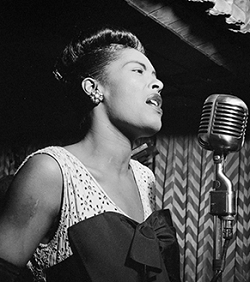 Billie Holiday, whose real name was Eleanora Fagan, had been an America's jazzy - movement musician brought into the world on April 7, 1915. Holiday's friend and musician Lester Young is said to have nicknamed Holiday "Lady Day" because she had a significant inventive impact on smooth jazz as well as rock music. Her melodic vocals, as well as her creative abilities, were well-known. Her singing technique, heavily influenced by jazz instrumentalists, introduced a fresh approach to timing and rhythm manipulation. Billie Holiday's later records welcomed different responses due to her hardships but also a changed accent, yet they are minor economic triumphs. The Holiday started to sing in Harlem nightspots, during which composer John Hammond discovered her; he admired her (Holiday's) voice. Around 1935, she secured a multi-year partnership with Brunswick. Childhood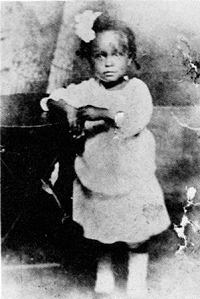 Billie Holiday was born on April 7, 1915, in Philadelphia, as a child of African-American unmarried adolescent lovers Sarah Julia and Clarence Halliday. Sarah relocated to Philadelphia at the very young age of nineteen after being removed from her family's residence in the Baltimore neighbourhood because of becoming a mother. Holiday grew up in Baltimore and went through a tough upbringing. Her mom occasionally took whatever was once regarded as transit occupations, working on tourist trains. Many researchers have questioned Billie's authenticity, citing a duplicate on holiday identity documents in Baltimore archives, which identifies her dad Frank DeViese. Early Days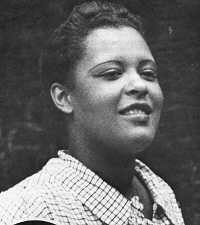 Holiday began to sing in clubs when she was a youngster. Holiday's professional alias was inspired by Billie Dove, an actor that Billie adored, as well as Clarence Halliday, her presumed dad. They were one combination, playing in venues, namely the Grey Dawn. Around November 1933, at the age of 18, Hammond held the stage for Billy to premiere her capture with Benny Goodman. Billie had then released singles, Your Mother's Son-in-Law, and the one more blockbuster, Riffin, the former of which became Billie's breakthrough success. Holiday's vocal manner astonished Hammond, who commented on Billie Holiday's voice virtually, transforming her musical preferences as well as her melodic existence. However, she was still the best women vocalist he'd met across someone who genuinely sounded like something from a jazzy improvisational artist. Music with Teddy WilsonHoliday's use of rhythm for emotional expression was ground-breaking. John Hammond recruited Billie to Brunswick around 1935 to record music melodies alongside Teddy Wilson within the jazz genre and to expand the arcade sector. They had authorized to make changes to the rhythm of the content for the ground-breaking performances. Brunswick did not enjoy the studio session since the company told Holiday to sound mostly like Cleo Brown. Nevertheless, just after the popularity of "What a Little Moonlight Can Do", the group launched to regard Billie Holiday as a musician in her own sense (or voice). Commercial Success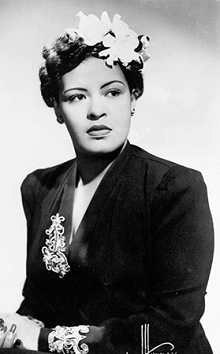 Billie's mom, sometimes known as The Duchess, launched Mom Holiday's restaurant. She gambled alongside representatives, including the Count Basie group, with some other people with whom she travelled mostly in the early 1930s, using cash through her child. 'God Bless the Child' was the song that quickly established Holiday's greatest success and favoured her other recorded song. It peaked at number twenty-five on the rankings in 1941 and placed 3rd on Billboard's music of the season list, selling more than millions of copies. Holiday collaborated alongside Paul Whiteman on Trav'lin Light across a new brand, Capitol Recordings. As she was in agreement with Columbia, she went by the pen name Lady Day. The track reached the rank of 23rd on the singles charts and topped the Album chart. Holiday became Twenty-nine years old before Milt Gabler hired her to Decca in 1944. Holiday's debut Decca single was 'Lover Man', which went to sixteenth position in music and number 5th in rhythm and blues and quickly became one of her greatest songs. The music's popularity and widespread dissemination established Holiday as a pop star, resulting in an increased number of solo performances, which were unusual for jazzy vocalists in the 1940s and 1950s. Holiday had reached her economic height by 1947, having obtained $250,000 in the three years preceding that. From 1946 to 1947, Holiday ranked second in the Downbeat poll, trailing Holiday by just a few votes compared to the highest result in the poll. Around May 16, 1947, Holiday got jailed from her New York residence over drug use. The case gained popularity and was called "United States vs Billie". Throughout the hearing, she learned that the council wasn't available to defend Holiday. Carnegie Hall IssueDue to his outstanding behaviour, Billie Holiday got slated for release in 1948. Bobby Tucker, Billie's keyboardist, with her dog named Mister, stood prepared for the time she was released and came to Newark. The Holiday was pinned to the ground well after the dog leapt at her, knocking off Holiday's hat. People thought that the dog was attacking her. However, she later stated that the dog loved her like crazy. 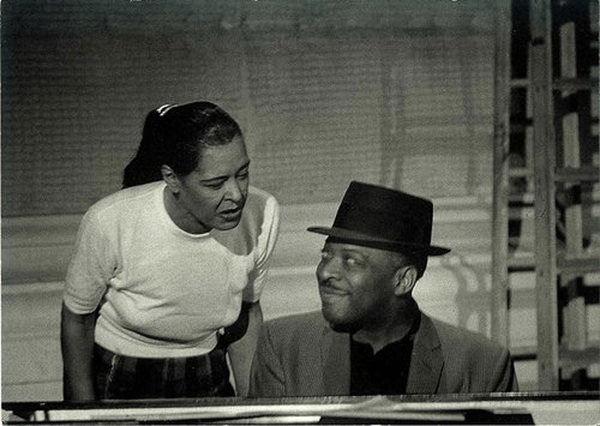 Holiday performed in Concert Hall in front of a sold-out audience on March 27, 1948. Ed Fishman, who battled Joe for Holiday's managership, considered a return performance in Concert Hall. Billie paused, worried whether viewers might embrace her following her imprisonment. Still, she relented and decided to attend. Bob Sylvester, with the manager, arranged that show to have a Broadway play for Holiday. This was managed to sell off or entitled Billie on Broadway. Billie stated that a usual song as well as theatrical reviewers arrived & handled everyone since they got legitimate. However, it shuttered within three weeks. By August 25, 1941, Billie wed musician Jimmy Monroe. On January 22, 1949, Billie was detained again in the room at Hotel Mark Twain in San Francisco. She claimed to have started taking heavy narcotics throughout the 1940s. This affected her career, and very few of her songs were played on the radio. She still hadn't provided adequate music profits before Billie signed with Decca. Therefore, her primary source of income included only club concerts. Holiday's albums fell so out of existence in the 1950s, which aggravated the situation. Throughout her later stages, Holiday rarely got earnings. Work with Count BasieBillie briefly worked as a huge singer alongside Count Basie in mid-1937. The group's touring circumstances frequently remained rough; they played several singles among bars, hopping from location to location with little consistency. Billie picked the songs she started singing and helped organize all such songs to convey her burgeoning personality of an unfortunate woman in romance. 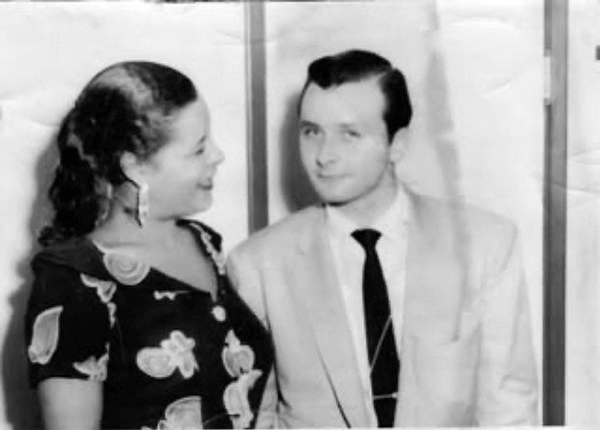 Billie discovered herself competing directly against renowned soprano Ella Fitzgerald. Fitzgerald began singing a Chick Webb Group that competed further with Count Basie Group. Fitzgerald topped a survey of the said crowd from third to first. Later, she became friend with Holiday. Billie left Count Basie's band in February 1938. Several explanations were suggested for her dismissal. Basie's lead-man singer, Jimmy, considered it disrespectful. Based on various reviews, Holiday got dismissed for becoming "temperamental and unreliable". She was complained to have declined to perform the music that would require her to change the approach. However, Holiday later complained about minimal fees and bad working circumstances. Work With Artie ShawArtie Shaw recruited Billie a few weeks after she had been sacked first from Basie Group. This affiliation made her one of the initial black women who collaborated alongside the white group, a novel combination somewhere at the moment. Holiday relates an instance in her official biography in that she had never been allowed to sit just on the concert stage between several performers since Holiday was a black person. Shaw was well-known for taking a stand for his singer. He asked Holiday to give a stand-up performance on the stage like other top-class performers, such as Helen Forrest, Tony Pastor and others. Billie Holiday had already travelled alongside Basie and Artie, would have a streak of FM as well as commercial successes alongside Teddy, and was a well-known pop singer. Artists all around the Country covered her melody song "What a Little Moonlight Can Do". Strange Fruit SongThroughout the 1930s, Holiday had been performing in Columbia. Once, she was brought to "Strange Fruit," the music from Abel Meeropol inspired by his poetry concerning lynching. It had begun hearing through Barney Josephson, the owner of Café Club, who brought it to Billie. Billie sang it alongside dread only at the restaurant around 1939, expecting reprisal. During most of the soundtrack length, the spotlight turned darker, and all other activities were put on hold. Just a modest light was used, revealing Billie's forehead when she started to perform. Billie claimed that the performance of 'Strange Fruit' recalled the event in which Billie's dad, Clarence, was refused hospital attention for a deadly respiratory illness following racial discrimination. Although the initial version received no airtime, the controversial track did well in sales, something Gabler ascribed primarily towards the album's contrary, Fine & Mellow, which served as a music box smash. In 1944, Billie reappeared, performing tracks she had written alongside Teddy Wilson. Lady Sings the BluesBillie's well-being had deteriorated through the 1950s as a result of excessive drug usage, alcoholism, or relationship issues involving offensive men. She featured in an ABC TV show. Her latter tapes revealed the effects of Billie's deteriorating wellness on Holiday's tone. 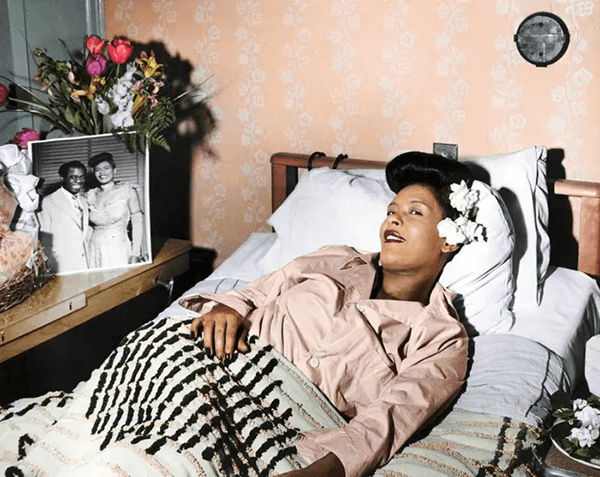 Billie's biography, "Lady Sings the Blues", was written by William Dufty and released around 1956. Dufty, who was engaged to Holiday's long-time friend Maely, produced the memoir swiftly after a sequence of chats alongside the artist in the Dufty's' 93rd Street residence. IllnessHoliday got afflicted having a form of liver cirrhosis in the initial days of 1959. Holiday quickly recovered despite having given up alcohol on the doctor's recommendation. Joe Glaser, Holiday's manager, jazz writer Leonard Feather, photojournalist, and the musician's personal companions all failed to get Holiday to the doctor. Holiday got transferred to New York's Central Clinic for surgery for both liver and cardiovascular ailments. The allegation states that Billy was aiming to perform more than the 'strange fruit' produced in the early and final period of her fight against Drugs, but this had not previously been mentioned elsewhere. Narcotics officers arrived at her local hospital, alleging to have discovered drugs in her home. As per Hari (writer and journalist), the allegation got disputed, following a ten-day hearing as part of Anslinger's (commissioner of the Federal Bureau of Narcotics) strategy. Hari blamed Anslinger for becoming liable for her demise. He later gave the Holiday final prayers on July 15. Holiday passed away at the age of 44. After Billie died, New York Times carried a brief tribute on page 15, including no byline. Holiday left a $1,000 legacy, while Holiday's best songs around the 1930s remained just out of circulation. LegacyThroughout her career, Billie Holiday acquired many style Magazine accolades. She, too, was nominated for the Grammys Hof, the Ertegun Jazz Hof, a Rock & Roll Hof, and indeed the American Society of Composers, Authors and Publishers Jazz Wall of Stardom (fame) after her death. Chirlane announced in 2019 that New York City might build a monument to remember Billie near her Queens Borough House. Her StyleThroughout Holiday's career, her method of delivery of songs made her concerts memorable. Her spontaneity made up for her insufficient musical expertise. Holiday stated how she just desired her vocal to seem like a mechanism, citing Louis Armstrong as well as artist Bessie Smith as inspirations. Billie continued to be the singles' most significant artistic impact. Lady Day is without a doubt the most significant effect on America's most well-liked singing as in the previous two decades. Hit SongsThe majority of Billie's hit songs have been issued mostly in the moniker Teddy Wilson & their Orchestra. Throughout her time with Wilson's group, Billie mostly performed in several bars, followed by a single from another artist. In mid-1936, Holiday started producing songs under her own name, called "Billie Holiday & Her Orchestra". By 1937, she had over 16 best-selling records. Billie's solo song, "Carelessly", came during this year's season. During 1939, Billie had her most sold record, "Strange Fruit", giving her greatest successful and popular season. Billboard started posting its contemporary pop rankings in 1940, including the Highest Grossing Commercial Songs list, which foreshadowed the Top 100. Billie's songs had not ranked mostly on popular music rankings since Billboard rarely released the top 10 in certain editions. Facts about Billie Holiday
Next TopicSong-joong-ki |